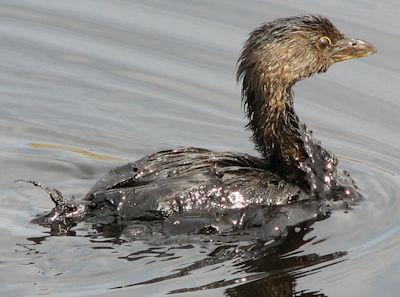Habitat Affected
Birds
Seabirds are amongst the most vulnerable inhabitants of open waters since they are easily harmed by floating oil. Species that dive for their food or which congregate on the sea surface are particularly at risk. Although oil ingested by birds during attempts to clean themselves by preening may be lethal, the most common cause of death is from drowning, starvation and loss of body heat following fouling of plumage by oil.

Cleaning and rehabilitation after oiling is often attempted, but for many species it is rare for more than a fraction of oiled birds to survive cleaning and rarer still for those that survive to breed successfully after release. Penguins are an exception and are much more resilient than most other birds. When handled properly, the majority are likely to survive the cleaning process and rejoin breeding populations.
Rocks
When oil that washes up on the shoreline, it coats and clings to every rock and grain of sand. Oil slick rocks cause increased slip, trip and fall hazards to emergency responders and cleanup workers.
Knowledge Check Choose the best answer for the question.
3-4. Which of the following seabirds is most likely to survive the cleaning process and rejoin breeding?
You forgot to answer the question!
